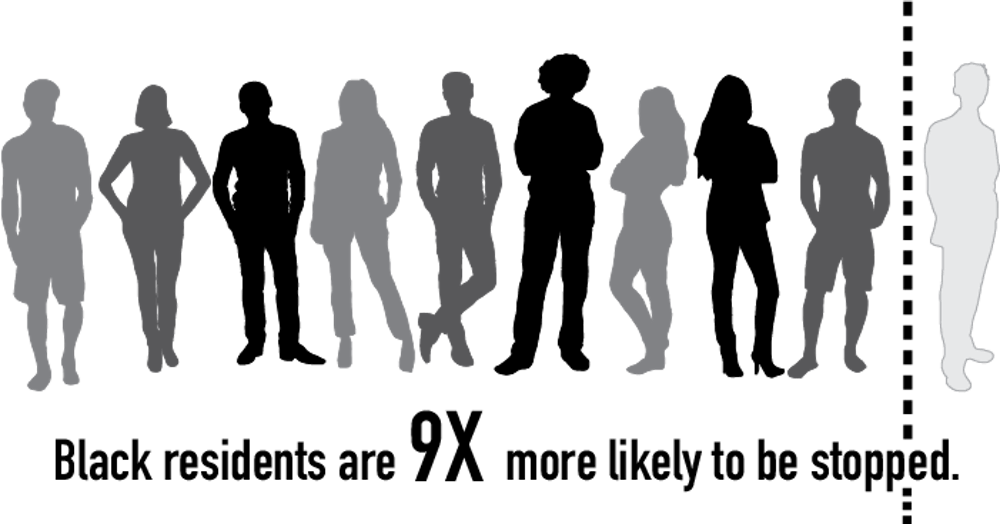Last month, Thierry Dupuis, the interim chief of the Charlottesville Police Department, presented to Charlottesville City Council the CPD’s report detailing the records from a 2017 investigative detentions report. Using 2016 census statistics and the proportions found in the report, The Cavalier Daily found that people identifying as black or African American were affected at roughly a nine times higher rate than the white residents of Charlottesville by CPD’s stop and frisk policies.
According to the City’s policy, police officers are authorized to stop individuals who they deem “suspicious.” Some incidents result in a search — where the officer searches the individual for contraband. This practice is frequently referred to as “stop and frisk,” and gained notoriety from its use in New York City.
The statistical report from the 2017 calendar year detailed that of the 173 total recorded stop incidents, 70 percent of the individuals were black. Of the 125 stop incidents with search-and-frisk, 91 of the individuals — or 73 percent — were black.
According to 2016 estimates of Charlottesville demographics, only 19 percent of the City identifies as black or African American.
The report was generated to give Council an update on the racial breakdown of recorded investigative detentions and “stop-and-frisk” encounters from the 2017 calendar year, and to “discuss strategies by which the City and its Police Department will continue to protect the rights of all of our residents”
Bill Farrar, director of strategic communications for the Virginia chapter of the American Civil Liberties Union, said the figures in the investigative report were surprising.
“The overwhelmingly high percentage of African-Americans who appear to be subjected to CPD's search-and-frisk practices is alarming, particularly as the City itself is less than 20 percent black,” Farrar said.
According to the CPD’s 2017 Constitutional Procedures Document, conducting a frisk of a detained person requires “justification beyond simply the reasonable suspicion” that can warrant a stop. The officer must be able to “articulate the basis for their suspicion that the person is armed or poses a danger to the officer or others,” the policy states.
A “stop-and-frisk” incident is when police are additionally permitted to pat down the outer clothing of the detained individual if there is reason to believe they are armed or dangerous.
This new data has encouraged the City Council to approve the creation of an independent Civilian Review Board. The purpose of the review board will be to increase transparency and communication between the CPD and the larger Charlottesville community.
Potential members of the CRB met for a public forum Tuesday to discuss several issues surrounding criminal justice reform in Charlottesville. Specifically, the board discussed what role the CRB would have in the reform proceedings.
Many members of the panel expressed frustration at the lack of availability and questioned the accuracy of the information they have been given surrounding stop and frisk in Charlottesville.
“Part of the problem with the statistics is that they are only as good as the data collection so if you're only selecting certain pieces of information … then you do not get a full picture,” said CRB candidate Sarah Burke, a University alumna and criminal defense investigator.
In this year’s report, several statistics were omitted — including the number of the reported stops resulting in an arrest or court summon. This statistic reveals whether the individuals were stopped because the officer had legitimate reason to believe they were committing a crime, or because the officer went off of an unjustifiable intuition.
CPD declined to comment on the omission from this report.
In 2016, a more comprehensive report revealed that out of the 97 detentions, 74 of the cases involved black individuals, but only 15 — or about 17 percent — of the individuals were arrested or served summons.
Comparatively, out of the 35 white people that were stopped in 2016, 11 — roughly 31 percent — of them were arrested or summoned to court.
The majority of the panel members — including CRB candidate Don Gathers, a deacon at the First Baptist Church and founder of Charlottesville’s chapter of Black Lives Matter — said that stop and frisk is a racist policy,
“[Stop and Frisk] is a very race-based, racist, failed policy,” Gathers said. “[The police] get … returns from the instability that they create in the community.”
Helen Plainsance, a 35-year resident of Charlottesville and candidate for the CRB, also commented on the inequalities in how Charlottesville police treat members of the community and the need for more standardized responses.
“If you approach it from the premise that the police should be treating each and every one of us the same way … that we are all entitled to the same protection … I think that we’ll have to come up with some standards that make some pretty strong statements about when certain kinds of behavior are tolerable in the community,” Plainsance said.
CRB candidate University Law Prof. Josh Bowers spoke on the need for increased transparency between the CPD and the community.
“We need to know how often this is going on — that’s where transparency comes in … that’s something the CRB can help with,” Bowers said.
Other panel members spoke of a need for communication and increased community involvement.
“The CRB should be able to review these types of policies independently and report directly to city council and make recommendations about how we should modify these policies,”said Evan Brown, a prospective member of the Citizen Review Board.
The Charlottesville Police Department was one of the first in Virginia to conduct a routine review of its investigative detention records, beginning after various court cases were brought against the New York Police Department for widespread patterns of racial profiling in cases of stop-and-frisk encounters.
Later in the report, CPD explained its practices differ from those in New York.
“Charlottesville Police Department has never undertaken or endorsed any pattern or practice of ‘stop and frisk’ such as NYPD’s — that’s specifically why Charlottesville’s internal review process was initiated years ago: to ensure that no such policy or practice will occur,” the report reads.
The report also stated the CPD plans to develop an audit process and a data-reporting system “designed to give the public confidence that adequate oversight is being implemented.”
Local civil rights attorney Jeff Fogel, who is a candidate for the CRB, argued the report wasn’t what the community needed.
“This report was a joke,” Fogel said. “The councilors asked to report on the status of stop and frisk, and what did they get? … Nothing was given by them, except to say, ‘no, we haven't looked at it and we don't think it’s a problem and we’re not going to dig deeper.’”
Farrar agreed, saying the report didn’t give enough details.
“I would also agree with others in the community that the data may not be complete and that additional scrutiny over both the policy and practice, as well as how this data is collected, is badly needed,” Farrar said.
For years, Fogel said he has been actively scrutinizing the CPD for racially discriminatory practices. He said he feels nobody is working to hold the department responsible.
“Nobody has been holding them accountable … [and] that goes right up to the city manager,” Fogel said. “He sits with the City Council, he’s heard the statistics … and apparently they're taking no action whatsoever … Nearly all of them have expressed concern about these numbers and yet they don't seem to be doing anything to make the changes here. Maybe this is wrapped up into who our new police chief is and whether that person will put an end to this.”
In terms of potential strategies and solutions to the racialized nature of stop and frisk practices in Charlottesville, City Manager Maurice Jones said at a March 19 City Council meeting that better training of officers was needed along with careful review of stop and frisk reports by police supervisors.
“Another important step is to dig deeper into the data,” Jones said. “We've got a group of folks who will be doing that with the City Manager’s Office, the police department, the City Attorney’s Office [and] the Commonwealth Attorney's office as well and getting a better understanding of some of the issues associated with [the data].”







